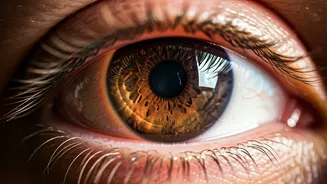Makeup Dangers
Using makeup daily can expose your eyes to infections and irritation. Mascara, eyeliner, and eyeshadow, when applied close to the eye, can introduce bacteria.
This can lead to conditions like conjunctivitis or styes. Sharing makeup with others increases these risks, as bacteria can easily transfer. Additionally, improper removal of makeup at night can trap particles, causing further irritation. It’s critical to replace eye makeup regularly to prevent bacterial growth. Using old or contaminated products can lead to more serious eye problems. Washing makeup brushes frequently is also vital, as they can collect bacteria that then transfer to your eyes. Make sure to choose hypoallergenic products if you have sensitive eyes.
Contact Lens Hazards
Contact lenses, though convenient, require meticulous care to maintain eye health. Improper hygiene is a major risk factor for infections. Always wash and dry your hands thoroughly before handling lenses. Using tap water to rinse or store lenses introduces harmful microorganisms. Always use fresh contact lens solution, and discard old solution. Failing to do so can lead to severe corneal infections. The lens case itself should be regularly cleaned and replaced. Additionally, wearing lenses for longer than recommended or sleeping in them can significantly increase the risk of eye problems. Any signs of redness, pain, or blurred vision should prompt immediate removal of the lenses and consultation with an eye care professional.
Habitual Irritants
Certain daily habits, beyond makeup and lenses, can also contribute to eye irritation. Rubbing your eyes, a common habit, can introduce bacteria and damage the delicate tissues. Prolonged screen time can lead to digital eye strain, causing dryness, fatigue, and blurry vision. This is due to reduced blinking while focusing on screens. Working or living in dry environments can exacerbate these issues, causing dryness and discomfort. Air conditioning and heating systems can decrease humidity, drying out the eyes. Similarly, exposure to allergens like pollen and dust can trigger allergic reactions, leading to itching and redness. Taking regular breaks to blink, using artificial tears, and maintaining a humid environment can help mitigate these problems.
Prevention Measures
Protecting your eyes involves implementing preventive measures to minimize risk. Practicing good hygiene, such as washing your hands before touching your eyes or lenses, is crucial. Regularly cleaning and replacing makeup and lens care products helps prevent the build-up of bacteria. Following the manufacturer’s instructions for contact lens care is essential for maintaining eye health. Scheduling regular eye exams enables early detection and treatment of potential problems. Using protective eyewear, like sunglasses, shields your eyes from harmful UV rays and environmental irritants. Taking breaks from screens, blinking regularly, and using artificial tears can alleviate digital eye strain. Recognizing and addressing these habits proactively can significantly reduce your risk of eye problems.













